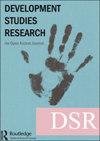新冠肺炎和南非新兴发展国家的国家协调应对
Q2 Social Sciences
引用次数: 1
摘要
2019冠状病毒病的社会经济影响导致国家角色的复苏,并推动了对由国家结构组成部分加强的新型应对措施的需求,这已不再是争议。国家结构成分是指国家在新冠肺炎疫情背景下减轻疫情影响的行政权力、资源和能力。本文探讨了中央和地方政府在协调努力减轻和应对大流行病方面的关系,以及国家主导的应对措施对南非发展国家雄心的意义。南非政府表现出利用其结构性组成部分的政治意愿,将其行政能力、资源和权力分配给政府的所有领域,通过其一揽子刺激计划抗击这一流行病。该国的流行病应对措施对加强体制安排和巩固一个协调良好和有能力的发展国家具有良好的影响。本文章由计算机程序翻译,如有差异,请以英文原文为准。
COVID-19 and state coordinated responses in South Africa’s emerging developmental state
ABSTRACT It is no longer debatable that the socio-economic impact of COVID-19 caused a resurgence in the role of the state and propelled the need for novel responses reinforced by the structural component of the state. The structural component of the state refers to the administrative power, resources and capacity of the state to mitigate the impact of the pandemic in the context of COVID-19. This paper explores the relationship between the central and local states in coordinating efforts to attenuate and respond to the pandemic, and the meaning of state-led responses for South Africa’s developmental state ambition. The South African government demonstrated political willingness to utilize its structural component by distributing its administrative capacity, resources and power to all the spheres of government to fight the pandemic through its stimulus package. The country’s pandemic responses reveal good implications for strengthening institutional arrangements and consolidating a well-coordinated and capable developmental state.
求助全文
通过发布文献求助,成功后即可免费获取论文全文。
去求助
来源期刊

Development Studies Research
Social Sciences-Development
CiteScore
3.20
自引率
0.00%
发文量
20
审稿时长
12 weeks
期刊介绍:
Development Studies Research ( DSR) is a Routledge journal dedicated to furthering debates in development studies. The journal provides a valuable platform for academics and practitioners to present their research on development issues to as broad an audience as possible. All DSR papers are published Open Access. This ensures that anyone, anywhere can engage with the valuable work being carried out by the myriad of academics and practitioners engaged in development research. The readership of DSR demonstrates that our goal of reaching as broad an audience as possible is being achieved. Papers are accessed by over 140 countries, some reaching over 9,000 downloads. The importance of the journal to impact is thus critical and the significance of OA to development researchers, exponential. Since its 2014 launch, the journal has examined numerous development issues from across the globe, including indigenous struggles, aid effectiveness, small-scale farming for poverty reduction, sustainable entrepreneurship, agricultural development, climate risk and the ‘resource curse’. Every paper published in DSR is an emblem of scientific rigour, having been reviewed first by members of an esteemed Editorial Board, and then by expert academics in a rigorous review process. Every paper, from the one examining a post-Millennium Development Goals environment by one of its architects (see Vandermortele 2014), to ones using established academic theory to understand development-imposed change (see Heeks and Stanforth 2015), and the more policy-oriented papers that contribute valuable recommendations to policy-makers and practitioners (see DSR Editor’s Choice: Policy), reaches a multidisciplinary audience.
 求助内容:
求助内容: 应助结果提醒方式:
应助结果提醒方式:


